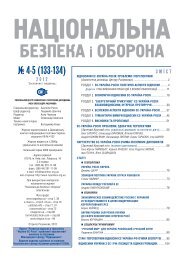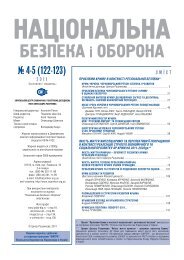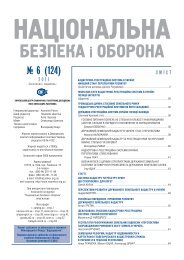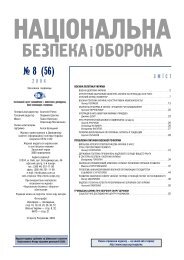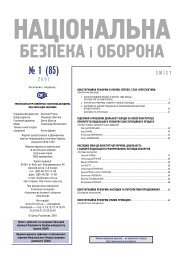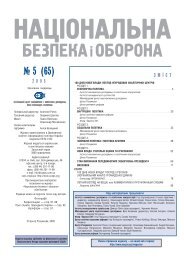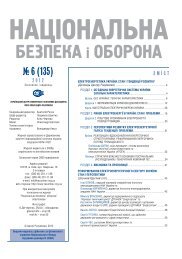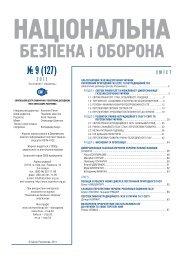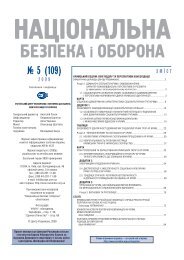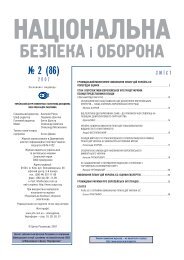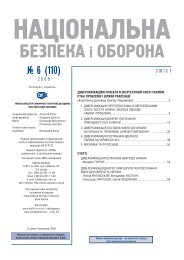RUSSIA THE EURASIAN CUSTOMS UNION AND THE EU COOPERATION STAGNATION OR RIVALRY?
RUSSIA, THE EURASIAN CUSTOMS UNION AND THE EU ...
RUSSIA, THE EURASIAN CUSTOMS UNION AND THE EU ...
- No tags were found...
You also want an ePaper? Increase the reach of your titles
YUMPU automatically turns print PDFs into web optimized ePapers that Google loves.
PUBLIC OPINION<br />
the European model of organisation of the state and<br />
society, as compared to the Russian one.<br />
Among the main advantages of the <strong>EU</strong>, citizens see<br />
the high level of social protection, rule of law, developed<br />
democracy, availability of financial resources, quality<br />
of healthcare, high levels of science and technology<br />
development, low level of corruption. The social<br />
dimension of the <strong>EU</strong> policy, according to respondents, is<br />
its main advantage over the Customs Union countries.<br />
Instead, the perceived advantages of the Customs<br />
Union include common history and culture, similar<br />
mentality among citizens of the Customs Union members,<br />
access to natural resources, energy supplies, as well as<br />
stable economic situation.<br />
Among the drawbacks of the <strong>EU</strong>, the Ukrainian citizens<br />
see unstable economic situation in some <strong>EU</strong> countries,<br />
uneven economic development of its member states,<br />
domination by some leading states over other countries,<br />
as well as differences in cultures, values, mentality of<br />
citizens of the <strong>EU</strong> countries, shortage of natural resources,<br />
unemployment.<br />
Meanwhile, corruption, grey economy, Russia’s<br />
domination, and lack of democracy are seen as major<br />
drawbacks of the Customs Union.<br />
4. People living in the Customs Union countries,<br />
according to respondents, are closer to Ukrainians mentally.<br />
However, judging by the logic of those polled, that mental<br />
kinship largely involves negative features: relatively low<br />
culture, social passivity, lack of personal dignity. Such<br />
qualities as high level of culture, social activity, sense of<br />
dignity, according to respondents, are more inherent in<br />
citizens of the <strong>EU</strong> countries.<br />
5. In terms of personal contacts and living experience,<br />
the Ukrainians are more familiar with the Customs Union<br />
countries than the <strong>EU</strong>. Respondents who visited the <strong>EU</strong><br />
countries are more prone to support Ukraine’s accession<br />
to the <strong>EU</strong> than those who did not visit them. Similarly,<br />
those who visited the Customs Union countries are<br />
keener to support Ukraine’s accession to the Customs<br />
Union than those who have never travelled there.<br />
However, visiting the <strong>EU</strong> makes it attractive for more<br />
than two-thirds of travellers, while visiting the Customs<br />
Union – for only half.<br />
The poll results lead to a conclusion that more<br />
attractive image of the <strong>EU</strong>, compared to that of the<br />
Customs Union, has been largely shaped under the<br />
influence of mass media.<br />
6. When assessing the effects of Ukraine’s integration<br />
with the <strong>EU</strong>, positive expectations prevail: possibility<br />
of a visa-free travel across the <strong>EU</strong> countries; perfection<br />
of the judicial system; access to advanced technologies;<br />
modernisation of enterprises; access to financial resources<br />
for economic development; enhancement of the rule of<br />
law; reduction of unemployment; creation of new working<br />
places. Drain of skilled manpower to the <strong>EU</strong> countries<br />
and deterioration of relations with Russia were among<br />
the negative effects most frequently mentioned by the<br />
respondents.<br />
Among the effects of Ukraine’s accession to the<br />
Customs Union, the respondents mentioned both positive<br />
(unification of the fraternal peoples; restoration of<br />
disrupted economic ties, free trade between countries of<br />
the Customs Union; improvement of relations with Russia;<br />
access to cheap energy resources; preservation of culture,<br />
traditions, moral values; discounts for goods and services<br />
from Russia, Belarus, Kazakhstan), and negative factors<br />
(dependence on Russia; Russia’s influence on internal<br />
processes in Ukraine; a step back in political, socioeconomic<br />
development; drifting apart from the <strong>EU</strong>).<br />
Comparing the conditions for innovative development<br />
of Ukraine, its transformation into a country with<br />
developed economy, social and cultural sector, a relative<br />
majority of Ukrainians polled preferred the <strong>EU</strong>.<br />
A relative majority (41%) of those polled believe that<br />
they will gain personal benefits from accession to the <strong>EU</strong><br />
(26% – will lose). The number of those who believe that<br />
they will win from accession to the Customs Union is<br />
equal to the number of those thinking they will lose.<br />
7. Supporters of the <strong>EU</strong> membership usually give<br />
economic reasons to explain their position, but also refer<br />
to social prospects and social changes set to take place<br />
in Ukraine following its accession to the <strong>EU</strong>, as well as<br />
facilitation of travel to the <strong>EU</strong> countries for Ukrainian<br />
citizens.<br />
The motives for standing against the <strong>EU</strong> membership<br />
fall into following groups: cultural and mental gap between<br />
Ukraine and the <strong>EU</strong> countries; inequality of partnership<br />
(“Ukraine will be dependent on the <strong>EU</strong>”); and the <strong>EU</strong>’s<br />
uncertain future.<br />
Cultural and mental kinship is clearly the main reason<br />
to support membership in the Customs Union. The next<br />
important motives are economic benefits and stability.<br />
The main motives for being against the accession to the<br />
Customs Union include inequality, Russia’s domination,<br />
danger of losing Ukraine’s independence, lack of prospects<br />
and backwardness of the union.<br />
8. According to those polled, corruption, low level of<br />
economic development, slow pace of reforms, issues in<br />
the field of democracy are the factors that stand on the<br />
way of Ukraine’s integration with the <strong>EU</strong>. Only Ukraine’s<br />
integration with the <strong>EU</strong>, as the majority believes, may<br />
impede Ukraine’s accession to the Customs Union.<br />
European integration, however, would mean meeting<br />
tough requirements put forward by the <strong>EU</strong>, while Ukraine’s<br />
accession to the Customs Unions would not require the<br />
fulfillment of such requirements.<br />
9. 42% of citizens support signing of the Association<br />
Agreement between the <strong>EU</strong> and Ukraine, while 33% are<br />
against it. One of the main motives for support is that the<br />
Agreement will mark the start of an accession process to<br />
the <strong>EU</strong>. At the same time, only 30% of respondents are<br />
familiar with the content of the Agreement.<br />
Assessing the effects of the Association Agreement,<br />
respondents often note its positive effects on most aspects<br />
of life. Only with regards to prices for goods and services,<br />
the proportion of those who expect a negative effect<br />
slightly exceeds the proportion of those who believe that<br />
the effect will be positive.<br />
10. Adherents of accession to the <strong>EU</strong> and adherents<br />
of accession to the Customs Union substantially differ<br />
in their socio-demographic and social features. The<br />
former are mainly people of younger and middle age,<br />
residents of the West and Centre, Ukrainian-speakers,<br />
people with high education and relatively high income and<br />
voters of the opposition parties; the latter are generally<br />
elderly people, residents of the South and East, often<br />
Russian-speakers with low education and income, voters<br />
of the Party of Regions and of the Communist Party.<br />
RAZUMKOV CENTRE • NATIONAL SECURITY & DEFENCE • №4-5, 2013 • 111



